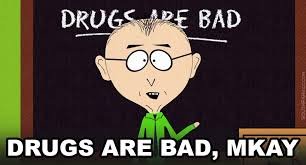How to Make Psychedelics Illegal Again
Historians talk about civilizations going through golden ages and dark ages, which are bound up in a culture’s resiliency in times of stress and crisis. I was born in 1976, and my initial exposure to psychedelics came right in the middle of the psychedelic dark age of the 1990’s.
My generation was given the simplistic message that drugs were bad, they would make you go crazy, and for “spiritual” people they were a shortcut to enlightenment that meant you weren’t serious about real spiritual work.
This dark age (like many historical dark ages) was preceded by the psychedelic golden age of the 1960’s. One of the rallying cries from that time period was coined by psychologist and psychonaut Timothy Leary who said “tune in, turn on, and drop out.” Young people were tuning into consciousness, turning on to the power of psychedelics, and most notably dropping out of society. Dropping out meant challenging every social norm, notably focussing on politics, sexuality, race and the Vietnam War.
LSD Pioneer Timothy Leary with Merry Prackster Neal Cassady
Of course, trying to start from scratch and throwing out all structures and hierarchies was not going to work in the long run. For every person that found the way to Be Here Now with Ram Dass, another fell into the arms of a Charles Manson– another LSD pioneer that many psychedelic proponents today would rather forget about. Yet Charley’s example is important to remember, for he showed us the dark side of psychedelics, the potential for abuse, the narcissistic excesses and the need for structures. Rather than engaging in nuanced dialogues, however, the powers that be used him and people like him to demonize and criminalize psychedelics. Off we went into the psychedelic dark age.
Just like golden ages, dark ages don’t last forever. We’ve now emerged into what is now generally called the psychedelic renaissance, evoking images of a new outpouring of art and culture. But where is our Jimi Hendrix and Abbie Hoffman? Where are the rabblerousers challenging the status quo?
Real LIfe Trickster Abbie Hoffman
Rather than a new flowering (which is more reminiscent of the 1960’s), we have a psychedelic culture based on the psychologized therapeutic model and its favorite word– safety. I’ve come around to safety lately. I used to trash the idea but I’ve seen how valuable it is for many people exploring psychedelics.
The reason history is so important is that where we are headed is directly tied to where we came from. For psychedelics, the dark excesses of the 1960’s is all mixed up with the challenges to those powers that be that I referenced earlier.
I believe that modern psychedelic promoters like MAPS recognized this dilemma a long time ago. And they decided (rightly or wrongly) that if they were going to get psychedelics legalized they’d have to play by the rules of the political game. It’s easier to make psychedelics legal if their proponents aren’t in conflict with the powers that be.
The political establishment doesn’t care if people use drugs, they care if people are trying to overthrow their system. The reason we don’t see a modern Ram Dass or Timothy Leary or Abbie Hoffman is because those guys are not safe. They are dangerous. And as long as psychedelics stay in their lane and treat an individual’s trauma and mental health rather than explore our culture they will stay on their path towards legalization.
Stay tuned for my next blog, which will explore how all of this impacts how we engage in our psychedelic communities.



